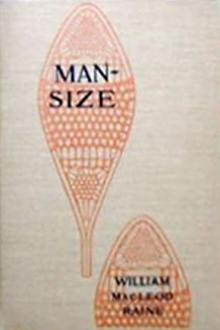Laughing Bill Hyde and Other Stories by Rex Beach (ebook smartphone .TXT) 📗

- Author: Rex Beach
Book online «Laughing Bill Hyde and Other Stories by Rex Beach (ebook smartphone .TXT) 📗». Author Rex Beach
The fellow obeyed reluctantly. Paul picked the key loose and examined it closely. While he was thus engaged, one of the reporters behind him said:
"Aha! At last he has the key to the mystery."
The general laughter ceased abruptly when the object of this banter thrust the key into his pocket and advanced threateningly toward the speaker, his face white with rage. The latter rose to his feet; he undertook to execute a dignified retreat, but Anderson seized him viciously, flung him back, and pinned him against the wall, crying, furiously:
"You dirty rat! If you open your face to me again, I'll brain you, and that goes for all of this death-watch." He took in the other five men with his reddened eyes. "When you fellows see me coming, hole up. Understand?"
His grip was so fierce, his mouth had such a wicked twist to it, that his victim understood him perfectly and began to grin in a sickly, apologetic fashion. Paul reseated the reporter at his desk with such violence that a chair leg gave way; then he strode out of the building.
For the next few hours Anderson tramped the streets in impotent anger, striving to master himself, for that trifling episode had so upset him that he could not concentrate his mind upon the subject in hand. When he tried to do so his conclusions seemed grotesquely fanciful and farfetched. This delay was all the more annoying because on the morrow the girl was to be buried, and, therefore, the precious hours were slipping away. He tried repeatedly to attain that abstract, subconscious mood in which alone shines the pure light of inductive reasoning.
"Where is that trunk? Where is that trunk? Where is that trunk?" he repeated, tirelessly. Could it be in some other rooming-house? No. If the girl had disappeared from such a place, leaving her trunk behind, the publicity would have uncovered the fact. It might be lying in the baggage-room of some hotel, to be sure; but Paul doubted that, for the same reason. The girl had been poor, too; it was unlikely that she would have gone to a high-priced hotel. Well, he couldn't examine all the baggage in all the cheap hotels of the city—that was evident. Somehow he could not picture that girl in a cheap hotel; she was too fine, too patrician. No, it was more likely that she had left her trunk in some railroad station. This was a long chance, but Paul took it.
The girl had come from Canada, therefore Anderson went to the Grand Trunk Railway depot and asked for the baggage-master. There were other roads, but this seemed the most likely.
A raw-boned Irish baggage-man emerged from the confusion, and of a sudden Paul realized the necessity of even greater tact here than he had used with the Scotch girl, for he had no authority of any sort behind him by virtue of which he could demand so much as a favor.
"Are you a married man?" he inquired, abruptly.
"G'wan! I thought ye wanted a baggage-man," the big fellow replied.
"Don't kid me; this is important."
"Shure, I am, but I don't want any accident insurance. I took a chance and I'm game."
"Have you any daughters?"
"Two of them. But what's it to ye?"
"Suppose one of them disappeared?"
The baggage-man seized Anderson by the shoulder; his eyes dilated; with a catch in his voice he cried:
"Love o' God, speak out! What are ye drivin' at?"
"Nothing has happened to your girls, but—"
"Then what in hell—?"
"Wait! I had to throw a little scare into you so you'd understand what
I'm getting at. Suppose one of your girls lay dead and unidentified
in the morgue of a strange city and was about to be buried in the
Potter's Field. You'd want to know about it, wouldn't you?"
"Are ye daft? Or has something really happened? If not, it's a damn fool question. What d'ye want?"
"Listen! You'd want her to have a decent burial, and you'd want her mother to know how she came to such a pass, wouldn't you?"
The Irishman mopped his brow uncertainly. "I would that."
"Then listen some more." Paul told the man his story, freely, earnestly, but rapidly; he painted the picture of a shy, lonely girl, homeless, hopeless and despondent in a great city, then the picture of two old people waiting in some distant farmhouse, sick at heart and uncertain, seeing their daughter's face in the firelight, hearing her sigh in the night wind. He talked in homely words that left the baggage-man's face grave, then he told how Burns, in a cruel jest, had sent a starving boy out to solve the mystery that had baffled the best detectives. When he had finished his listener cried:
"Shure it was a rotten trick, but why d'ye come here?"
"I want you to go through your baggage-room with me till we find a trunk which this key will fit."
"Come on with ye. I'm blamed if I don't admire yer nerve. Of course ye understand I've no right to let ye in—that's up to the station-master, but he's a grouchy divil." The speaker led Paul into a room piled high with trunks, then summoned two helpers. "We'll move every dam' wan of them till we fit your little key," he declared; then the four men fell to.
A blind search promised to be a job of hours, so Paul walked down the runway between the piles of trunks, using his eyes as he went. At least he could eliminate certain classes of baggage, and thus he might shorten the search; but half-way down the row he called sharply to the smashers:
"Come here, quick!" At his tone they came running. "Look! that one in the bottom row!" he cried. "That's it. Something tells me it is."
On the floor underneath the pile was a little, flat, battered tin trunk, pathetically old-fashioned and out of place among its more stylish neighbors; it was the kind of trunk Paul had seen in his mother's front room on the farm. It was bound about with a bit of rope.
His excitement infected the others, and the three smashers went at the pile, regardless of damage. Anderson's suspense bid fair to choke him; what if this were not the one? he asked himself. But what if it were the right one? What if this key he clutched in his cold palm should fit the lock? Paul pictured what he would see when he lifted the lid: a collection of forms, hangers, patterns, yard-sticks, a tape measure, and somewhere in it a little black yarn mitten. He prayed blindly for courage to withstand disappointment.
"There she is," panted his Irish friend, dragging the object out into the clear. The other men crowded closer. "Come on, lad. What are ye waitin' for?"
Anderson knelt before the little battered trunk and inserted the key. It was the keenest moment he had ever lived. He turned the key; then he was on his feet, cold, calm, his blue eyes glittering.
"Cut those ropes. Quick!" he ordered. "We're right."
The man at his side whipped out a knife and slashed twice.
"Come close, all of you," Paul directed, "and remember everything we find. You may have to testify."
He lifted the lid. On the top of the shallow tray lay a little black yarn mitten, the mate to that one in the city Morgue.
Anderson smiled into the faces of the men at his side. "That's it," he said, simply.
The tall Irishman laid a hand on his shoulder, saying: "Yer all right, boy. Don't get rattled,"
Paul opened the till and found precisely the paraphernalia he had expected: there were forms, hangers, patterns, yard-sticks, and a tape measure. In the compartment beneath were some neatly folded clothes, the needlework of which was fine, and in one corner a bundle of letters which Anderson examined with trembling fingers. They were addressed to "Miss Mabel Wilkes, Highland, Ontario, Canada, Care of Captain Wilkes."
The amateur detective replaced the letters carefully; he closed and locked the trunk; then he thanked his companions.
"If I had a dollar in the world," said he, "I'd ask you boys to have a drink, but I'm broke." Then he began to laugh foolishly, hysterically, until the raw-boned man clapped him on the back again.
"Straighten up, lad. Ye've been strained a bit too hard. I'll telephone for the cops."
In an instant Paul was himself. "You'll do nothing of the sort," he cried. "Why, man, you'll spoil the whole thing. I've worked this out alone, and if the police hear of it they'll notify all the papers and I'll have no story. Burns won't give me that job, and I'll be hungry again."
"True! I forgot that fat-headed divil of an editor. Well, you say the word and nobody won't know nothin' from us. Hey, boys?"
"Sure not," the other men agreed. This lad was one of their kind; he was up against it and fighting for his own, therefore they knew how to sympathize. But Paul had been seized with terror lest his story might get away from him, therefore he bade them a hasty good-by and sped up-town. His feet could not carry him swiftly enough.
Burns greeted him sourly when he burst into the editorial sanctum. It was not yet twenty-four hours since he had sent this fellow away with instructions not to return.
"Are you back again?" he snarled. "I heard about your assaulting Wells down at the City Hall. Don't try it on me or I'll have you pinched."
Paul laughed lightly. "I don't have to fight for my rights any more."
"Indeed! What are you grinning about? Have you found who that girl is?"
"I have."
"What?" Burns's jaw dropped limply; he leaned forward in his chair.
"Yes, sir! I've identified her."
The fat man was at first incredulous, then suspicious. "Don't try any tricks on me," he cried, warningly. "Don't try to put anything over—"
"Her name is Mabel Wilkes. She is the daughter of Captain Wilkes, of Highland, Ontario. She was a country dressmaker and lived with her people at that place. Her trunk is down at the Grand Trunk depot with the rest of her clothes in it, together with the mate to the mitten she had when she killed herself. I went through the trunk with the baggage-master, name Corrigan. Here's the key which I got from her purse at the coroner's office."
Burns fixed his round eyes upon the key, then he shifted them slowly to Anderson's face. "Why—why—this is amazing! I—I—" He cleared his throat nervously. "How did you discover all this? Who told you?"
"Nobody told me. I reasoned it out."
"But how—Good Lord! Am I dreaming?"
"I'm a good newspaper man. I've been telling you that every day. Maybe you'll believe me now."
Burns made no reply. Instead, he pushed a button and Wells, of the City Hall squad, entered, pausing abruptly at sight of Anderson. Giving the latter no time for words, Mr. Burns issued his instructions. On the instant he was the trained newspaper man again, cheating the clock dial and trimming minutes: his words were sharp and decisive.
"That suicide story has broken big and we've got a scoop. Anderson has identified her. Take the first G.T. train for Highland, Ontario, and find her father, Captain Wilkes. Wire me a full story about the girl Mabel, private life, history, everything. Take plenty of space. Have it in by midnight."
Wells's eyes were round, too; they were glued upon Paul with a hypnotic stare, but he managed to answer, "Yes, sir!" He was no longer grinning.
"Now, Anderson," the editor snapped, "get down-stairs and see if you can write the story. Pile it on thick—it's a corker."
"Very good, sir, but I'd like a little money," that elated youth demanded, boldly. "Just advance me fifty, will you? Remember I'm on top salary."
Burns made a wry face. "I'll send a check down to you," he promised, "but get at that story and make it a good one or I'll fire you tonight."
Anderson got. He found a desk and began to write feverishly. A half-hour later he read what he had written and tore it up. Another half-hour and he repeated the performance. Three times he wrote the tale and destroyed it, then paused, realizing blankly that as a newspaper story it was impossible. Every atom of interest surrounding the suicide of the girl grew out of his own efforts to solve the mystery. Nothing had





Comments (0)